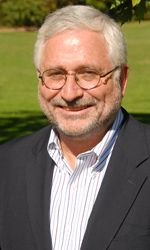Perspectives from David McLaughlin, VP of Agriculture for WWF
March 18, 2015
We recently spoke with David McLaughlin, Vice President of Agriculture for the global conservation organization WWF, (hyperlink) which has worked with Cargill on several projects to improve the sustainability of palm oil, corn and beef production. Here’s what he had to say.
 David McLaughlin, WWF VP of Agriculture
What impact does agriculture have on the environment?
David McLaughlin, WWF VP of Agriculture
What impact does agriculture have on the environment?
Right now, agriculture occupies around 33 percent of the land area on the planet. It uses 70 percent of the water, it’s responsible for 20 percent of greenhouse gases, but as I like to point out, it also feeds 100 percent of us. Agriculture is not going to go away. The question becomes, how can we get more from less? If you take a look at palm oil, for example, with the yield improvements of new varieties, some companies are getting 7 to 8 tons of oil per hectare, which is double some of the national averages. So we can theoretically envision being able to satisfy our projected demand for palm oil off the same land footprint, we just have to be smart about it.
Palm oil gets a really bad environmental rap. Do you believe it can be good for the environment if managed correctly?
Absolutely. I managed a palm oil plantation in Central America for 10 years during the 80s. My opinion of palm oil is that it can be a really great crop. It’s an ideal development crop for smallholders because it provides good cash flow, it requires minimum technology. It’s not prone to many diseases, it withstands floods. But if you take those same attributes and you put them into a setting where you have weak governance and no enforcement of the rules, it turns into an environmental disaster. The issue isn’t palm oil; the issue is how palm oil is developed. The same goes for other commodities.
Some people believe companies like Cargill are part of the problem. Why do you see us as part of the solution?
People tend to view this as an either/or proposition: either you can have agricultural development or protect biodiversity. I know from experience that these are not necessarily mutually exclusive. Having spent almost 30 years in Latin America working for Chiquita Banana International, I understand the financial realities of the private sector, but I also know it’s possible to find solutions that benefit the environment and the business. You’ve just got to look for the middle ground.
You’ve worked with Cargill for seven years on various projects. What do you see as our main strengths?
Coming from a plantation background, I see the strong focus that you have on health and safety and I am very familiar with how difficult that can be. The other great thing about Cargill is that you’ve been really open, honest and transparent in our work together. You do a good job of being forthcoming, explaining the complexities of the issues and working collaboratively to find solutions.
Where could we do more?
My criticism of Cargill—and this is starting to be addressed—is that you need to have an overarching framework when it comes to all of these sustainability issues. This will help you understand what these environmental issues mean for your day-to-day decision-making process and help ensure all the business units are guided appropriately. It’s a tough challenge, I recognize, but developing that framework is really important.
Earth Day and World Environment Day both take place in April. How would you encourage people to think about these days?
Every day when I walk into my office, I’m greeted by the banner in our atrium that says, “Be the voice for those that have no voice.” Humans are really in a position of deciding which species we’re going to bring with us to the year 2050. In Sumatra, Indonesia, there are only 300 Sumatran tigers left and some 2,000 Sumatran elephants. That’s it. Their habitat is being trashed and shredded while we speak. That’s a pretty tough thing to talk about, but it’s the reality of the challenges that we are all facing.
